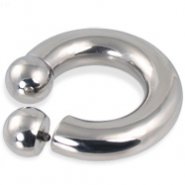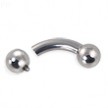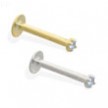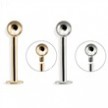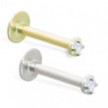Internally Threaded Circular Barbell, 0 Ga
- Gauge (Thickness): 0 (8.0mm)
- Material: 316L surgical grade stainless steel
- Type: circular barbell
- Threading Type: Internally Threaded
| Click on the picture to see a big picture and description of the body jewelry you are interested in. | |||||||||
|---|---|---|---|---|---|---|---|---|---|
|
Internally Threaded Curved Barbell, 6 Gauge
$7.99
Internally Threaded Curved Barbell, 6 Gauge
Shown: 13mm curved barbell. |
14K Gold internally threaded labret with...
$50.99
14K Gold internally threaded labret with aquamarine 1mm CZ
|
14K Gold Internally Threaded Labret, 14Ga
$50.99
14K Gold Internally Threaded Labret, 14Ga
|
14K Gold internally threaded labret with...
$50.99
14K Gold internally threaded labret with clear 1.5mm CZ
|
||||||
TREATING BODY PIERCINGS
The piercing is susceptible to infection while it is healing. Appropriate aftercare is important to reduce the risk of infection.
Wash your hands thoroughly with antibacterial soap before touching your piercing or jewelry.
The piercing should be cleaned twice a day while it is healing. Over-cleaning can irritate the piercing; do not clean more often unless the piercing has been exposed to dirt, sweat, or bodily fluids. Saline solution may be used to remove dried discharge between cleanings.
The shower provides the best place to adequately lather and rinse piercings. After washing and rinsing your hands apply the soap / cleanser lather around and on the piercing while rotating the jewelry. Remove any dried discharge from the jewelry using a cottonswab and hot water before rotating the jewelry; do not use your fingernails. Allow the lather saturate the piercing for 3 minutes. Rinse the piercing, jewelry and the surrounding area thoroughly under running water. While rinsing rotate the jewelry several times.
Do not use a washcloth or sponge to clean your piercing. Cloths and sponges trap and collect bacteria and mildew. For this reason use a tissue or paper towel to dry your piercing after you clean it. The inside of the navel traps moisture and should be dried thoroughly using a cotton swab.
Warm salt water soaks help remove dried discharge and lymph secretions, relieve itching, and increase circulation to the piercing. ¼ teaspoon sea salt or table salt to 8 ounces of distilled water is suggested. Epsom salt (hydrated magnesium sulfate) is not the same chemical composition as sea salt or table salt (sodium chloride). Suggested soaking regimen is 10 to 15 minutes once or twice a day. The tub or container used for soaking should be disinfected using a household disinfectant or bleach solution. If more than one piercing requires soaking disposable cups are recommended to prevent spreading an infection from one piercing to another. If you feel a stinging sensation or your piercing bleeds while soaking, discontinue soaking until the piercing has begun to seal along the inside (usually 1 - 2 weeks).
Do not use bath additives or bubble baths while the piercing is healing.
Do not allow your piercings to come into contact with another person's bodily fluids.
The most frequent causes of infection are touching the piercing or the jewelry with unwashed hands or contact with unclean items such as clothing and bedding.
Swimming in public pools, spas and hot-tubs is advised against as one can never be sure of the quality of sanitation and the risk of exposure to bacteria is too great. Although some people have experienced no ill-effects from swimming in ocean / sea water most piercers maintain that the risks of exposure to unhealthy elements outweighs any benefits the salt water may have.
Laundry detergents containing stain-fighting enzymes should not be used.
The enzymes can destroy epithelial (healing) cells and delay healing.
After the healing process is complete you should continue to clean your piercing once a day as part of your bathing or showering routine to prevent accumulation of dirt and dead skin cells.
